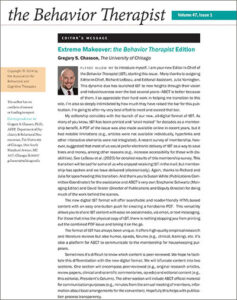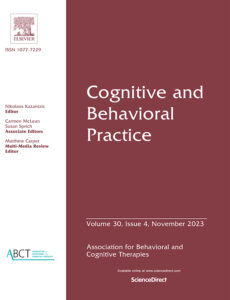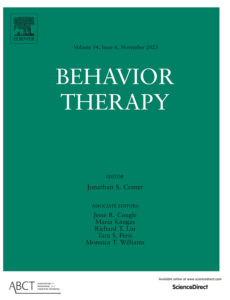Find a CBT Therapist
Search through our directory of local clinicians.
ABCT Journals
Welcome to ABCT Journals
Your membership in ABCT entitles you to online access to both Behavior Therapy and Cognitive and Behavioral Practice. Print versions are also available for an additional fee. You also receive print copies of the Behavior Therapist and can also access it from our archived PDFs.
the Behavior Therapist Journal

Cognitive and Behavioral Practice Journal

Behavior Therapy Journal

Call for Papers
Beyond Chance: Bridging Research and Clinical Practice in the Implementation of Cognitive Behavioral Therapies for Gambling Disorder
Cognitive and Behavioral Practice
Submission deadline: 01 June 2025
Gambling opportunities have expanded dramatically around the world via legalization in new jurisdictions (e.g., 38 States in the US have legalized sports betting since 2018) and via technological innovations such as loot boxes in video games and betting from one’s smartphone. For some, gambling becomes a maladaptive pattern with harmful consequences. Meta-analyses consistently demonstrate the efficacy of cognitive behavioral therapies (CBT) in reducing gambling behavior and its negative consequences (e.g., Pfund et al., 2023). Yet, a wide range of approaches to treat gambling disorder exist under the umbrella term of CBT.
Guest editors:
- Jeremiah Weinstock, PhD, ABAP - jeremiah.weinstock@health.slu.edu;
- Simone Rodda, PhD - simone.rodda@aut.ac.nz;
- Rory A. Pfund, PhD - rapfund@memphis.edu
Special issue information:
Consistent with the aims and scope of Cognitive and Behavioral Practice, this special issue seeks to bridge the gap between clinical research and practice of CBT in the context of gambling disorder treatment. We seek manuscripts that detail implementation/knowledge translation of CBT protocols for gambling disorder in clinical practice. Additionally, many CBT for gambling disorder interventions were initially developed from other substance-related addictive disorders; yet the process and pitfalls by which these interventions were adapted for gambling disorder remains largely unexplored. Moreover, as CBT treatments for gambling disorder are developed and demonstrate efficacy, questions emerge such as how to tailor CBT to address: (a) comorbid psychiatric disorders, (b) individuals’ diverse identities and cultural backgrounds, and (c) new treatment modalities (e.g., mHealth apps).
We invite high-quality manuscripts on CBT for gambling disorder, such as:
- Cognitive and behavioral assessment methods used to guide treatment for gambling disorder and co-occurring problems.
- Use of motivational interviewing to facilitate behavior change and/or maximize client engagement in CBT.
- Guidelines and case examples demonstrating how to use various CBT approaches and specific components of CBT, including cognitive restructuring, implementation of values-based alternatives to gambling, exposure-based treatments, couples-based treatment, and incorporation of self-help tools, industry offered responsible gambling programs, and concerned significant others.
- Development of online and mHealth app approaches using CBT.
- Dissemination of evidence-based practice in the provision of gambling disorder CBT treatment from an implementation science perspective (e.g., Consolidated Framework for Implementation Research).
- Cultural adaptations of CBT for gambling disorder or adaptations for vulnerable populations.
- Tailoring gambling disorder treatment in the context of comorbid disorders, and adapting evidence-based approaches for other psychiatric disorders and areas of clinical concern to gambling disorder.
- CBT approaches for specific gambling activities (e.g., sports betting, social casinos) and varying levels of gambling severity (e.g., brief interventions).
Manuscript submission information:
Cognitive & Behavioral Practice has a primary focus on the application and implementation of CBT procedures. Submissions are expected to include rich descriptions of clinical interventions, examples of client-therapist dialogue, significant case descriptions, video demonstrations, or therapist guidelines. It is a requirement that submissions be clinically instructive. Author guide: https://www.elsevier.com/journals/cognitive-and-behavioral-practice/1077-7229/guide-for-authors
We encourage authors to submit a letter of intent to Jeremiah Weinstock by March 1, 2025. Guest editors may provide feedback on fit for the special call. The deadline for submissions is June 1, 2025.
Early submissions are encouraged, and the review process will begin immediately. Accepted articles will be published early online and will be collected for release in a print special issue.
Click here for the manuscript submission portal.
Manuscript submission inquires:
- Jeremiah Weinstock, PhD, ABAP - jeremiah.weinstock@health.slu.edu;
- Simone Rodda, PhD - simone.rodda@aut.ac.nz;
- Rory A. Pfund, PhD - rapfund@memphis.edu
Check out the FAQs on special issues.
Learn more about the benefits of publishing in a special issue.
Interested in becoming a guest editor? Discover the benefits of guest editing a special issue and the valuable contribution that you can make to your field.
Journal Editors Directory
Search the Journal Editors Directory
Journal Support
Journal access is automated through your login to the ABCT.ORG website. Once you have logged into the site, you can click on the links to the individual journals.
Once at the journal site, you may personalize your experience by providing your email address.
Should you require any assistance, please do not hesitate to contact the closest Customer Support department as follows:
Customers in North, Central, and South America should contact:
Telephone: 1-888-615-4500
(+1 212-462-1978 if calling from outside the USA and Canada)
Fax: +1 212-633-3680
E-mail: usinfo@sciencedirect.com
Customers in Europe, The Middle East and Africa should contact:
Telephone: +31 20 485 3767
Fax: +31 20 485 3432
E-mail: nlinfo@sciencedirect.com
Customers in Asia Pacific including Australia (except Japan) should contact:
Tel: +65 6 349 0222
Fax: +65 6 733 1510
Email: sginfo@sciencedirect.com
Customers in Japan should contact:
Telephone: +81 3-5561-5034
Fax: +81 3-5561-5047
E-mail: jp.dls@elsevier.com
